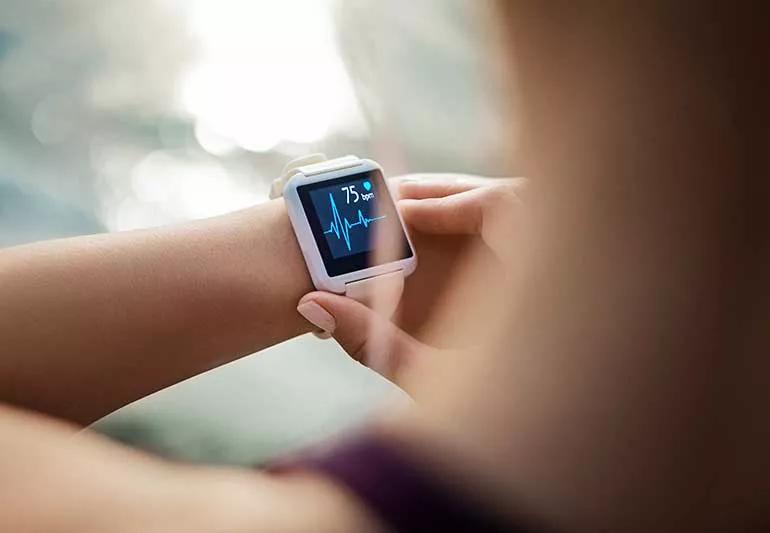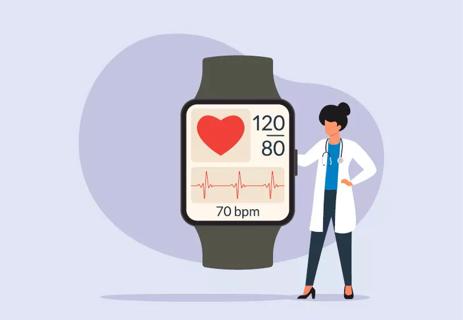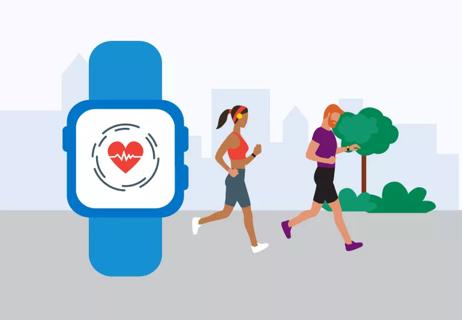60 to 100 beats per minute is ‘normal,’ but you can still be healthy outside that range

When it comes to understanding your health, there are a lot of numbers that matter. You monitor your weight. Check your blood sugar levels, cholesterol, platelets and more.
Advertisement
Cleveland Clinic is a non-profit academic medical center. Advertising on our site helps support our mission. We do not endorse non-Cleveland Clinic products or services. Policy
And then, there’s another number that can give you a glimpse into your health. It’s your heart rate — a measure of how often your heart beats.
A normal adult heart rate is between 60 and 100 beats per minute (bpm). But that’s not to say that a heart rate above or below those thresholds is necessarily something to worry about.
“There’s a range of ‘normal’ when it comes to healthy heart rates,” explains cardiologist Tamanna Singh, MD. “What’s more telling than knowing whether you fall in the ‘normal’ range is knowing what’s normal for you and checking in with your body for signs of distress.”
You can check your heart rate yourself, using devices like smartwatches or going old school and counting your heart beats by feeling your pulse in your wrist or neck.
But what is your heart rate really telling you? Dr. Singh explains.
Essentially, your heart rate is a gauge of how hard your heart is working to pump your blood.
We’re talking here about your resting heart rate — as in, how fast your heart beats when you’re not exercising or engaging in serious physical activity. (Of course, when you’re exercising, your heart rate should go up.)
A resting heart rate less than 60 bpm is called bradycardia. A resting heart rate higher than 100 bpm is called tachycardia.
Advertisement
Even though they have fancy medical names, bradycardia and tachycardia aren’t necessarily problems. Because there are a lot of reasons your heart rate may higher or lower than the “normal” range.
Your resting heart rate can be influenced by things like your:
Dr. Singh explains more.
Typically, people who aren’t in peak physical condition are more likely to have a higher resting heart rate. That’s because a less efficient heart needs to pump more frequently to move a similar volume of blood.
What’s more, anything that taxes your body or mind can cause a rise in your heart rate.
“In stress situations, like an infection, your heart has to pump more often to meet the demands of the body,” Dr. Singh states.
Likewise, your mental health can have a surprising impact on your heart rate.
“Mental stress and anxiety activate the same parts of your nervous system as physical exercise,” Dr. Singh explains. “Anxiety activates your fight-or-flight response, which correlates to an increase in heart rate and increase in blood pressure.”
Some reasons for a higher heart rate include things like:
On the flip side, a lower heart rate may be an indication of a heart that’s working more efficiently. It can be very normal and healthy for athletes, for example, to have a resting heart rate in the 40s.
“Overall, as your heart becomes stronger, it can pump out more blood to the body with each contraction,” Dr. Singh further explains. “It doesn’t have to pump as often to meet the demands. So, we get more bang for our buck with each heartbeat — and, therefore, a lower resting heart rate.”
People over the age of 65 typically have lower heart rates than younger people, as their hearts experience wear and tear that causes them to slow down. And keeping your stress levels low can contribute to a slower heart rate, too.
What are some causes for a slower heart rate?
Your heart rate is just one indicator of your health. In order to understand whether your heart rate is a sign of a potential problem, you need more information.
For starters, look for patterns. Get to know what your heart rate typically is by monitoring it using a smartwatch app or feeling your pulse. That way, you can start to understand what’s normal for you.
Advertisement
“Say your heart rate trends consistently show your resting heart rate is 45,” Dr. Singh illustrates. “If you feel well, you exercise, you don’t feel ill and don’t have any known heart issues, that’s probably OK.”
If you notice your heart rate is falling outside of your normal range, check in with your body.
What symptoms should you look for?
| Possible symptoms associated with high heart rate | Possible symptoms associated with low heart rate |
|---|---|
| Chest discomfort. Chest pain. Shortness of breath. | Fatigue or low energy. Lightheadedness. Dizziness. Passing out. |
| Possible symptoms associated with high heart rate | |
| Chest discomfort. Chest pain. Shortness of breath. | |
| Possible symptoms associated with low heart rate | |
| Fatigue or low energy. Lightheadedness. Dizziness. Passing out. |
An abnormal heart rate coupled with these signs of concern should be your cue to get medical attention. Because a change in your heart rate along with these symptoms may indicate that your heart isn’t functioning at its best.
A healthcare provider can perform an EKG (electrocardiogram) to get more information. An EKG can help them assess your heart rate and rhythm and further look into your heart function, if needed. They can also discuss your medical history, medications you take and other explanations for your symptoms.
Remember: While the typical heart rate is between 60 and 100 bpm, a heart rate outside that range can still be healthy. If you’re concerned that your ticker isn’t working quite right, or if you have worrisome symptoms, talk with a healthcare provider, like a primary care doctor or cardiologist. They can help get to the heart of the issue.
Advertisement

Sign up for our Health Essentials emails for expert guidance on nutrition, fitness, sleep, skin care and more.
Learn more about our editorial process.
Advertisement

Your pulse and heart rate measure different body processes, but in most cases, they’re the same number

Deep breathing, yoga and meditation are just some ways to bring your heart rate down right away

Lifestyle changes can help strengthen your heart so it doesn’t have to work as hard when your body is at rest

A resting heart rate below 35–40 beats per minute or over 100 beats per minute may be cause for concern

Your heart rate naturally slows down while you sleep, but lower numbers aren’t always concerning

Both are related to your cardiovascular system, and both can impact the other

Bradycardia, or a low heart rate, is more likely as you age — and could be a sign of health issues

Setting a max heart rate for kids can be tough, so focus more on how they feel during activity

Even small moments of time outdoors can help reduce stress, boost mood and restore a sense of calm

A correct prescription helps your eyes see clearly — but as natural changes occur, you may need stronger or different eyeglasses

Both are medical emergencies, but they are very distinct events with different causes